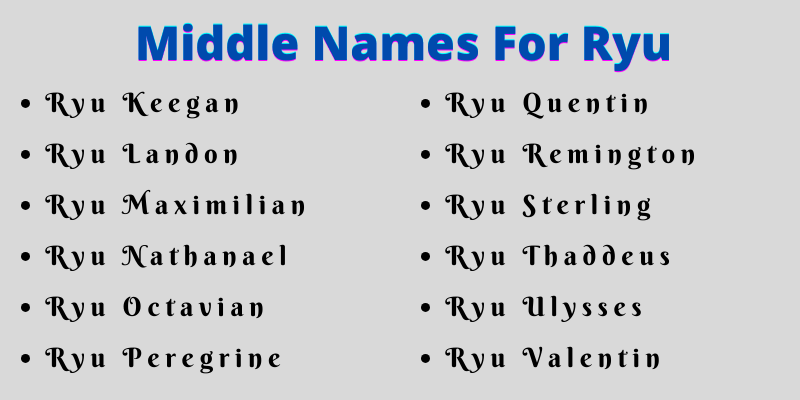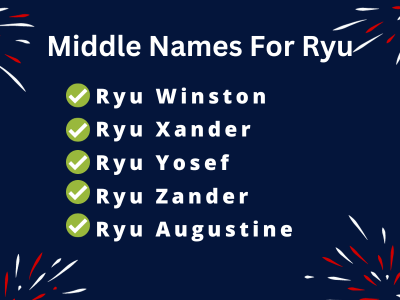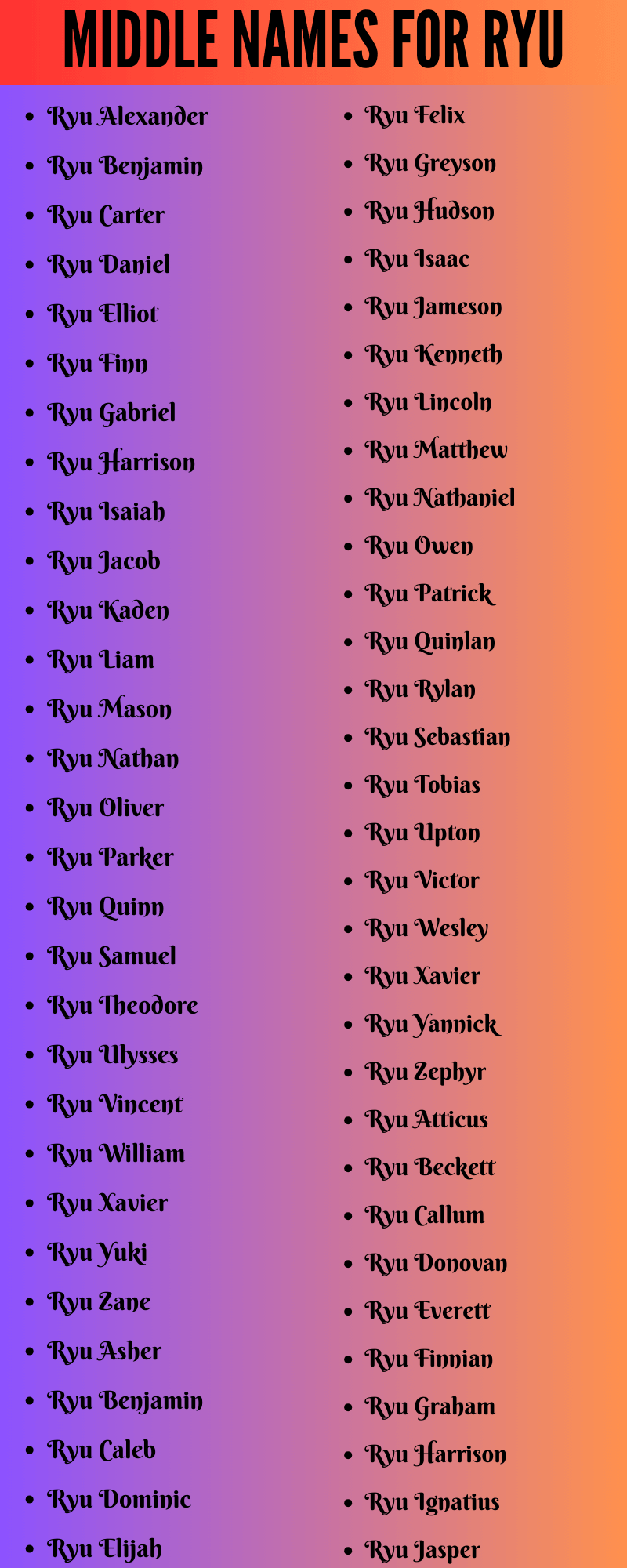Last Updated on 14 February 2025 by Mubashir Rafique
Are you curious about the meaning, origin, and popularity of the name Ryu? Well, you’ve come to the right place! In this blog article, I’ll be sharing all the fascinating details about the Ryu name. So, let’s dive right in!
When it comes to names, I find it incredibly intriguing to explore their meanings, origins, and how they have evolved over time. In this article, I will be delving into the world of Ryu, uncovering its rich history and shedding light on its significance in various cultures. Whether you’re considering naming your child Ryu or simply have a keen interest in names, this article will provide you with a comprehensive understanding of this unique name.
As a baby name consultant with years of experience, I have had the pleasure of assisting countless parents in their quest to find the perfect name for their little ones. Through my research and interactions with families, I have come across the name Ryu numerous times, and it has always sparked curiosity among parents. Its distinctiveness and charm make it a popular choice for those seeking a name that stands out from the crowd.
Now, let’s get to the exciting part! In this article, you can expect to find not only the meaning and origin of the name Ryu but also a treasure trove of additional information. I will be sharing potential middle names that pair beautifully with Ryu, suggesting sibling names that complement it perfectly, and even exploring last names that create a harmonious combination. So, get ready to embark on a journey of discovery as we unravel the world of Ryu and all that it encompasses.
Stay tuned for the rest of the article, where we’ll explore the captivating meaning, origin, and popularity of the name Ryu, along with a plethora of suggestions to help you create the perfect name combination. Let’s dive in and uncover the wonders of Ryu together!
Ryu Name Meaning
The name Ryu, originating from Japan, holds a profound significance that resonates with its bearers. Derived from the Japanese word “ry?,” meaning “dragon,” this name embodies strength, power, and wisdom. In Japanese culture, dragons are revered as mythical creatures symbolizing good fortune and protection. Thus, individuals named Ryu are often associated with these qualities.
Ryu is not a common name in the English-speaking world, which adds to its allure and uniqueness. Its rarity makes it a distinctive choice for parents seeking a name that stands out from the crowd. The name Ryu carries an air of mystery and intrigue, captivating those who encounter it.
With an argumentative writing style, it is essential to delve deeper into the significance of the name Ryu. Its association with dragons sparks debates about the symbolism and cultural interpretations of these majestic creatures. Some argue that dragons represent chaos and destruction, while others emphasize their role as guardians and bringers of prosperity.
Furthermore, the name Ryu can also be seen as a reflection of one’s character traits. Those named Ryu are often perceived as ambitious, determined, and fiercely independent individuals. They possess an innate ability to lead and inspire others, much like the mythical dragons they are named after.
In conclusion, the name Ryu holds a captivating allure, rooted in its Japanese origins and its association with dragons. Its uncommonness adds to its appeal, making it a distinctive choice for individuals seeking a name that embodies strength, power, and wisdom. Whether one believes in the mythical qualities of dragons or not, there is no denying the impact and significance that the name Ryu carries.
Ryu Name Origin
The origin of the name Ryu can be traced back to ancient Japan, where it holds deep cultural significance. Derived from the Japanese language, Ryu is a masculine given name that translates to “dragon” in English. This name carries a rich history and symbolism, reflecting the revered mythical creature in Japanese folklore.
In Japanese mythology, the dragon, or “ryu,” is a powerful and majestic creature associated with strength, wisdom, and good fortune. It is believed to possess the ability to control water and bring rain, making it a symbol of prosperity and abundance. The name Ryu, therefore, embodies these qualities and is often bestowed upon individuals who are seen as strong, wise, and destined for success.
The allure of the name Ryu lies not only in its captivating meaning but also in its unique sound and structure. With its short yet impactful two-letter composition, Ryu stands out among other names, exuding an air of mystery and strength. Its simplicity is juxtaposed with its profound symbolism, making it a name that resonates with individuals seeking a name that is both distinctive and meaningful.
In contemporary society, the name Ryu has gained popularity beyond its Japanese origins. It has transcended cultural boundaries, captivating individuals worldwide who are drawn to its exotic allure and the sense of power it evokes. Whether chosen for its cultural significance or its aesthetic appeal, the name Ryu continues to leave a lasting impression, embodying the spirit of the dragon and all that it represents.
Ryu Name Popularity
The name Ryu, derived from Japanese origins, has been gaining popularity in the English-speaking world in recent years. This surge in interest can be attributed to various factors, including the growing fascination with Japanese culture and the increasing trend of multicultural naming practices.
Ryu, meaning “dragon” in Japanese, carries a sense of mystique and power, which undoubtedly contributes to its appeal. The name’s uniqueness sets it apart from more conventional choices, making it an attractive option for parents seeking a distinctive moniker for their child.
Despite its rising popularity, Ryu remains relatively uncommon in comparison to traditional English names. This rarity adds an air of exclusivity and individuality to those who bear the name, further fueling its allure.
The argument for choosing Ryu as a name lies in its ability to transcend cultural boundaries. In an increasingly globalized world, parents are seeking names that reflect their appreciation for diverse cultures. Ryu accomplishes this by blending Japanese heritage with an English-speaking context, creating a harmonious fusion of identities.
In conclusion, the popularity of the name Ryu in the English language is on the rise. Its unique and powerful connotations, combined with its multicultural appeal, make it an intriguing choice for parents looking to bestow a distinctive name upon their child. As the world becomes more interconnected, names like Ryu serve as a testament to the beauty of cultural exchange and the celebration of diversity.
Is Ryu a Boy or Girl Name?
Ryu is a unisex name of Japanese origin. While traditionally more commonly used as a boy’s name, it can also be given to girls. The name Ryu means “dragon” in Japanese, symbolizing strength and power. In recent years, there has been a growing trend of using gender-neutral names, and Ryu fits into this category. Therefore, Ryu can be considered both a boy or girl name, depending on personal preference and cultural context.
How To Pronounce Ryu in the English Language
Ryu, a name that carries the weight of Japanese martial arts and video game history, often leaves English speakers perplexed when it comes to pronunciation. To master the art of pronouncing Ryu, one must delve into the intricacies of phonetics and embrace the nuances of the English language.
The correct pronunciation of Ryu involves a combination of sounds that may seem unfamiliar to the untrained ear. Begin by pronouncing the initial “r” sound, but be mindful to avoid the common English “r” sound. Instead, opt for a softer, more rolled “r” sound, similar to the Spanish “rr.”
Next, move on to the “y” sound, which is pronounced as a long “e” sound followed by a short “oo” sound. This unique combination creates a distinct phonetic blend that captures the essence of Ryu’s name.
Conclude with the final “u” sound, which is pronounced as a short “oo” sound, similar to the “u” in “put.” This subtle distinction adds depth to the pronunciation, ensuring accuracy and authenticity.
Mastering the pronunciation of Ryu requires patience and practice. Embrace the challenge, and let the beauty of the Japanese language guide you towards a flawless execution. Remember, it is through dedication and attention to detail that one can truly honor the legacy of Ryu.
Is Ryu a Good Name?
The question of whether Ryu is a good name is a contentious one, with passionate arguments on both sides. On the one hand, Ryu is a unique and exotic name that carries a sense of mystery and intrigue. Its origins can be traced back to Japanese culture, where it holds significant meaning. The name Ryu, derived from the Japanese word for “dragon,” symbolizes strength, power, and wisdom. It evokes images of mythical creatures soaring through the skies, leaving a lasting impression on anyone who hears it.
However, detractors argue that Ryu may be difficult for non-Japanese speakers to pronounce correctly. Its unfamiliarity in Western cultures may lead to mispronunciations and misunderstandings. Additionally, some may argue that Ryu is too unconventional and may subject the bearer to unnecessary attention or scrutiny.
Despite these arguments, it is important to remember that a name’s worth is subjective and deeply personal. What may be considered a good name for one person may not resonate with another. Ultimately, the decision to name a child Ryu should be based on the parents’ cultural background, personal preferences, and the significance they attach to the name.
In conclusion, whether Ryu is a good name or not depends on individual perspectives and cultural contexts. Its uniqueness and symbolism make it an intriguing choice, but its potential challenges in pronunciation and acceptance should also be considered. Ultimately, the decision lies with those who hold the responsibility of naming a child, and they should choose a name that resonates with their values and aspirations.
Famous People Named Ryu
- Ryu Hyun-jin – Korean baseball pitcher, meaning “dragon,” popular in South Korea.
- Ryuichi Sakamoto – Japanese musician and composer, meaning “dragon one,” globally recognized.
- Ryu Seung-ryong – South Korean actor, meaning “dragon spirit,” highly acclaimed.
- Ryu Soo-young – South Korean actor, meaning “dragon excellence,” widely known.
- Ryu Jun-yeol – South Korean actor, meaning “dragon talented,” rising popularity.
- Ryu Hwa-young – South Korean singer and actress, meaning “dragon child,” emerging talent.
- Ryu Seung-min – South Korean table tennis player, meaning “dragon victory,” Olympic champion.
- Ryu Deok-hwan – South Korean actor, meaning “dragon virtuous,” respected performer.
- Ryu Voelkel – American entrepreneur and author, meaning “dragon ruler,” niche popularity.
- Ryu Murakami – Japanese novelist and filmmaker, meaning “dragon village,” cult following.
Variations of Name Ryu
- Ryuji – A popular Japanese name meaning “dragon child.”
- Ryunosuke – A unique name meaning “son of the dragon.”
- Ryutaro – A strong name symbolizing “dragon boy” in Japanese.
- Ryuga – A powerful name representing “dragon fang” in Japanese.
- Ryuki – A cool name meaning “dragon spirit” in Japanese.
- Ryoma – A historical name associated with “dragon horse” in Japanese.
- Ryusuke – A traditional name meaning “dragon aid” in Japanese.
- Ryuto – A modern name symbolizing “dragon soar” in Japanese.
- Ryushin – A mystical name representing “dragon heart” in Japanese.
- Ryuki – A unique name meaning “dragon knight” in Japanese.
30 Nicknames for Name Ryu with Meanings
- The Dragon: Represents strength and power.
- Master of Martial Arts: Signifies expertise in combat.
- Fearless Warrior: Conveys bravery and fearlessness.
- The Unyielding: Reflects determination and resilience.
- The Silent Assassin: Suggests stealth and deadly precision.
- The Zen Fighter: Emphasizes a calm and focused approach.
- The Swift Blade: Symbolizes quickness and agility.
- The Iron Fist: Represents a powerful punch.
- The Shadow Walker: Implies stealth and elusiveness.
- The Thunderous Strike: Signifies a forceful and impactful attack.
- The Serene Samurai: Reflects a peaceful yet skilled warrior.
- The Phoenix: Represents rebirth and resilience.
- The Noble Protector: Conveys a sense of honor and guardianship.
- The Steel Dragon: Symbolizes a strong and formidable presence.
- The Lightning Bolt: Suggests speed and agility.
- The Immovable Mountain: Reflects unwavering strength and stability.
- The Whirlwind: Implies a fast and relentless attack.
- The Silent Storm: Signifies a calm yet powerful force.
- The Iron Will: Represents determination and unwavering resolve.
- The Blazing Fist: Symbolizes a fiery and powerful punch.
- The Lone Wolf: Conveys independence and self-reliance.
- The Rising Sun: Reflects a new beginning and potential.
- The Thunderclap: Suggests a sudden and impactful strike.
- The Tranquil Warrior: Implies a calm and composed fighter.
- The Steel Hurricane: Signifies a powerful and destructive force.
- The Immortal Blade: Represents eternal skill and mastery.
- The Silent Guardian: Reflects a watchful and protective nature.
- The Unbreakable Spirit: Conveys resilience and unwavering determination.
- The Fiery Phoenix: Symbolizes a powerful and unstoppable rebirth.
- The Zen Master: Implies a wise and enlightened fighter.

30 Similar Names to Ryu with Meanings
- Akira – Bright and intelligent; clear
- Hiroshi – Generous; prosperous; abundant
- Kazuki – Peaceful and shining; harmonious
- Kenji – Intelligent and second son
- Masaru – Victory and excellence; noble
- Satoshi – Wise and quick-minded; clear-thinking
- Tatsuya – Dragon and abundant; prosperous
- Yuki – Courageous and snow; happiness
- Akihiro – Bright and generous; vast
- Haruki – Shining and radiance; clear
- Kaito – Ocean and flying; soaring
- Makoto – Sincere and truthful; genuine
- Ryo – Distant and refreshing; cool
- Shiro – Fourth son and castle; white
- Toshiro – Intelligent and talented; wise
- Yuji – Brave and second son; excellence
- Daiki – Great and shining; splendid
- Hikaru – Radiant and shining; light
- Kenta – Healthy and strong; robust
- Naoki – Honest and open-minded; upright
- Ren – Lotus and love; romance
- Shota – Soaring and big; vast
- Taro – Big and eldest son; firstborn
- Yuma – Calm and truth; genuine
- Daisuke – Great and help; assistance
- Haru – Spring and clear; bright
- Koji – Radiant and second son; light
- Nori – Belief and law; doctrine
- Riku – Land and sky; earth
- Yuto – Gentle and abundant; prosperous

30 Middle Names for Ryu with Meanings
- Ryu Akira: Bright and intelligent dragon.
- Ryu Haruki: Springtime dragon with great strength.
- Ryu Kazuki: Peaceful dragon with a harmonious spirit.
- Ryu Hiroshi: Generous and prosperous dragon.
- Ryu Masaru: Victorious and brave dragon.
- Ryu Kenji: Wise and strong-willed dragon.
- Ryu Takeshi: Fierce and determined dragon.
- Ryu Kaito: Oceanic dragon with a mysterious aura.
- Ryu Satoshi: Quick-thinking and resourceful dragon.
- Ryu Haruto: Sunlit dragon with boundless energy.
- Ryu Makoto: Sincere and honest dragon.
- Ryu Shinji: Tranquil and serene dragon.
- Ryu Yuki: Snowy dragon with a calm demeanor.
- Ryu Tatsuya: Dragon with a strong sense of justice.
- Ryu Ryo: Dragon with a noble and dignified presence.
- Ryu Hiroto: Expansive and prosperous dragon.
- Ryu Kazuya: Peaceful and harmonious dragon.
- Ryu Akio: Bright and joyful dragon.
- Ryu Haru: Springtime dragon full of vitality.
- Ryu Masato: Victorious and accomplished dragon.
- Ryu Kenzo: Wise and determined dragon.
- Ryu Takeshi: Fierce and indomitable dragon.
- Ryu Kaito: Oceanic dragon with a captivating allure.
- Ryu Satoshi: Quick-witted and resourceful dragon.
- Ryu Haruki: Sunlit dragon with boundless enthusiasm.
- Ryu Makoto: Sincere and genuine dragon.
- Ryu Shinji: Tranquil and composed dragon.
- Ryu Yuki: Snowy dragon with a serene nature.
- Ryu Tatsuya: Dragon with an unwavering sense of justice.
- Ryu Ryo: Dragon with a regal and majestic presence.

30 Sibling Names for Ryu
- Akira – Bright and intelligent warrior.
- Haruki – Shining and joyful spring.
- Kaito – Ocean or sea adventurer.
- Sakura – Beautiful cherry blossom flower.
- Hiroshi – Generous and prosperous individual.
- Yumi – Bow or archery beauty.
- Kenji – Intelligent and strong second son.
- Aiko – Beloved and cherished child.
- Kazuki – Harmonious and hopeful peace.
- Mei – Beautiful and graceful sister.
- Haru – Springtime or clear weather.
- Takeshi – Fierce and strong warrior.
- Emi – Blessed with beauty and kindness.
- Yuki – Snow or happiness in winter.
- Rina – Elegant and beautiful companion.
- Daichi – Great wisdom and intellect.
- Hana – Flower or blossom of grace.
- Tatsuya – Loyal and accomplished individual.
- Mika – Beautiful fragrance or aroma.
- Sora – Sky or vast open space.
- Yuna – Gentle and compassionate sister.
- Ren – Lotus or love and kindness.
- Ayumi – Progress or walking with purpose.
- Koji – Radiant and shining second child.
- Nami – Wave or ocean’s beauty.
- Yori – Dependable and trustworthy sibling.
- Asuka – Fragrant and peaceful tomorrow.
- Riku – Land or earth’s strength.
- Yoko – Positive and cheerful child.
- Shinji – True and genuine individual.
